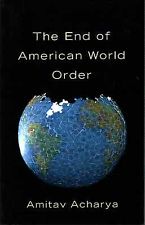
The End of American World Order, by Amitav Acharya. Polity Books, 2014. R$22,06 (Kindle, www.amazon.com.br)
Just because (…) rising powers have benefited from the American-dominated international order does not mean they would leave it intact and follow America’s lead.
Perhaps the most important lesson of the Crimean Crisis, Amitav Acharya recently wrote in The Hindu, is that the U.S. can no longer co-opt rising powers to support its own strategic vision and approach. The unipolar moment, he argues in The End of American World Order, his latest book, is over. Yet what comes next? Rather than a multipolar, bipolar or G-zero world (as Charles Kupchan argued in No one’s world), the emerging world order is likely to be neither bipolar nor multipolar. Instead, we are heading towards a “multiplex world order.”
The major difference between multipolarity and multiplex order, according to the author, is that the latter is marked by unprecedented levels of interdependence that is far more complex than those in early 20th century Europe. The metaphor of the multiplex cinema is interesting, but not immediately intuitive (however, I admit I have not been to one) – after all, how exactly is the content of one movie in a large theater related to another?
Acharya’s second big argument is that global order will be more decentered than before, providing regional powers with greater scope for local and regional approaches. That will sound like bad news to many U.S. policy analysts (and somewhat contradictory to his previous claim), but the author rejects Mearsheimer’s predictions that multipolarity will be messy and unstable. Quite to the contrary, he says, the result of multiple powers could lead to greater international cooperation. Interestingly enough, he also criticizes liberals for often falsely assuming a simple equation between US-American preponderance and peace. He rejects Ikenberry’s notion that British and American-led liberal order have been built in key respects around consent. Looking into the future, he argues that “no major Western analyst (…) accepts that the US decline might be good for international order either in general or in specific areas such as development, governance, and international justice.” Multipolarity, he implies, may turn out to be better than today’s global order. He strengthens this argument with an elegant and succinct critique of the liberal vision of US-led global order in chapter 3.

Acharya also calls for a fresh look at regionalism in the post-unipolar order, pointing out that most powers will be unable to project meaningful influence beyond their respective regions, and that regional organizations such as ECOWAS and ASEAN have become more sophisticated multipurpose organizations. NEPAD, the AU, ECOWAS and Mercosur have begun to establish peer-review mechanisms that may have led to the punishment, suspension and even intervention in member states that did not respect democracy or human rights. Even ASEAN, against all odds, has set up an intergovernmental human rights mechanism. The author argues that regionalism has remained “open” and supportive of multilateral regimes, so worries about competitive “bloc” formation are usually exaggerated. Rather, Acharya writes, the proliferation and broadening functions of regional institutions may “introduce a healthy diversity and leadership into the emerging world order instead of the singular dominance of American power or the EU’s legalistic and centralized model of cooperation”.
Looking into the future, the author does not believe that any rising powers will be able to replace US hegemony – rather, they will assume regional leadership in a concert model. This will almost certainly be true in the medium term – in the long, however, it is hard to imagine how China, by 2030 representing one third of global GDP, would not strive to turn into a global hegemon. For the next 15 years, however, his predictions sound plausible, particularly concerning the growing role of regional bodies. The End of American World Order is thus extremely valuable contribution to the debate about the future of global order.
Acharya’s analysis is refreshing because its perspective is neither US-centric (such as the vast majority of leading thinkers in the discipline) nor anti-American. His decision to question the consensus among US policy makers and thinkers that the only alternative to US hegemony is global instability and chaos is both unusual and courageous, particularly considering that Acharya is based in Washington, D.C.
Few mainstream academics in the United States are likely to support his view, too worried about making themselves ineligible for a future position in the U.S. State Department, the Department of Defense or the White House. Indeed, no policy maker in Washington would take the political risk of offering a position to the author. Thankfully, Amitav Acharya is unlikely to care much.
Read also:
Book review: “The rise of the BRICS in Africa” by Pádraig Carmody
Book review: “China Goes Global: The Partial Power” by David Shambaugh
Book review: “Samudra Mathan: Sino-Indian Rivalry in the Indo-Pacific” by C. Raja Mohan








